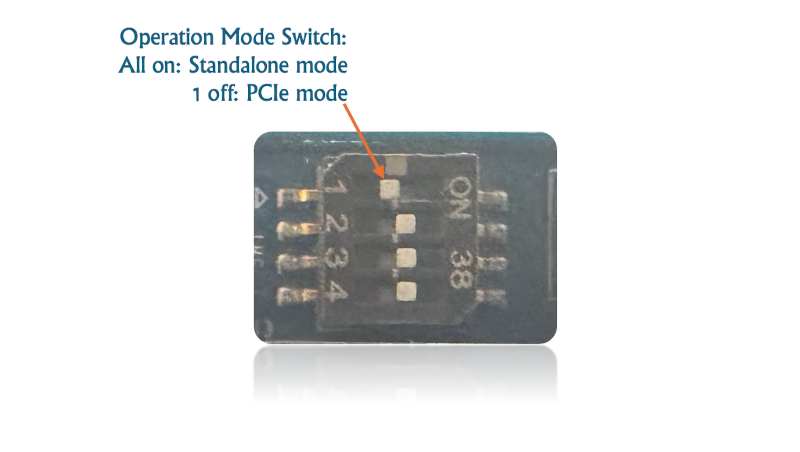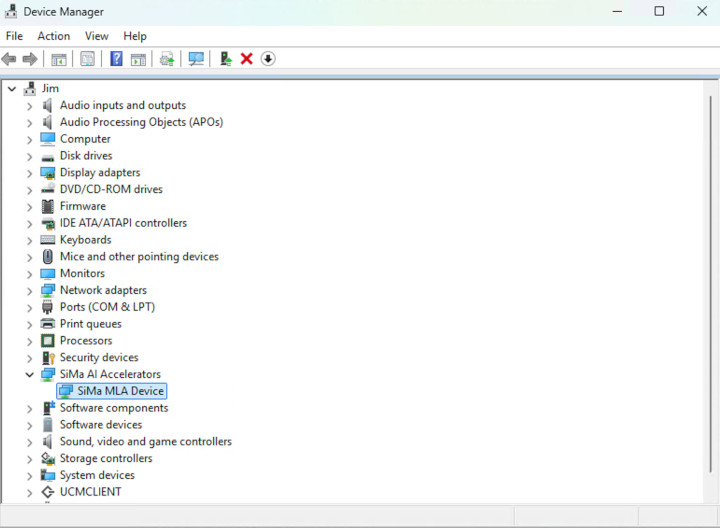PCIe Mode
Note
Currently, the MLSoC PCIe card is Generally Available (GA), while the Modalix PCIe card is in Early Access (EA).
Note
Please install or upgrade sima-cli before continuing. This guide is intended for use with the latest sima-cli version.
Before you begin:
Make sure the host machine’s operating system is Ubuntu version 22.04 LTS or higher.
Configure your host machine’s UEFI/BIOS settings for optimal performance and proper driver functionality.
On Intel-based machines, enable SRIOV, IOMMU, and VT-D.
On AMD-based machines, disable AMD-V and enable IOMMU.

On the MLSoC DevKit, there are four dip switches as shown above. Make sure switch #1 is in
OFFposition.Make sure the Run/Program switch is ON.
Power off the host machine, insert the DevKit into the PCIe slot, and power on the host machine.
On the Modalix Early Access PCIe card, keep the DIP switch in its factory-default position.
If the host motherboard provides both a primary (blue) and a non-primary (black) PCIe slot, install the SiMa PCIe card in the secondary slot.
For a detailed view of the DevKit interfaces, switches and connectors, refer to the SiMa.ai DevKit Interface.
Note
In rare cases, if you do not need the driver to be automatically loaded when the host machine reboots,
create (or edit if already exists) /etc/modprobe.d/blacklist.conf and add the line blacklist sima_mla_drv. Once done, run update-initramfs and reboot the host machine.
After reboot the drivers can be loaded manually using insmod or modeprobe.
Run the following command on the Linux host to install the driver.
sima-user@sima-user-machine:~$ sima-cli install drivers/linux
... ... ...
=== Driver Installation Validation ===
Component | Status | Details
----------------------------------------------------------------
GStreamer | PASS | ✅ GStreamer plugin 'pciehost' installed
Kernel Module | PASS | ✅ Kernel module 'sima_mla_drv' installed
PCI Devices | PASS | ✅ Detected SiMa PCIe device(s):
- 0000:04:00.0 Modalix HHHL v2 driver=sima_mla_drv
✅ Installation complete.
Note
Please be advised that your MLSoC DevKit may be operating with outdated firmware out of the box.
To ensure optimal performance and compatibility, we recommend updating the DevKit in standalone mode first to the matching firmware version as the host driver.
For detailed instructions on updating your MLSoC DevKit in standalone mode, see here.
After the system is setup, then you can use sima-cli to update the DevKit using virtual IP address.
Run the following command on the Windows host to install the driver.
Warning
This feature is currently in technical preview. Installing this driver will place the system into driver test-signing mode. You will be prompted to confirm before any system changes are made.
C:\Users\sima> sima-cli install drivers/windows ... ... ... ✅ Downloaded: pcie_develop_10082025_2.00.081025.1_B31.exe 🚀 Running installation script in: C:\Users\sima 📜 Script: pcie_develop_10082025_2.00.081025.1_B31.exe ╭─ Post-Installation Instructions ─╮ │ │ │ Driver successfully installed │ │ │ ╰──────────────────────────────────╯ ✅ Installation completed successfully.Check the Windows device manager for the SiMa AI device.

Note
The Virtual Network feature is available in firmware version 1.5 and later on the Linux host. To use this feature,
make sure your DevKit is updated to the latest firmware version.
This feature is only available for the Linux host system.
When connected to a host system via PCI Express (PCIe), the SiMa.ai DevKit establishes a virtual ethernet interface. This interface enables direct network communication between the host and the DevKit over high-speed PCIe bus.
The Virtual Network feature is primarily designed for debugging purposes, allowing users to:
Secure Shell (SSH): Access the DevKit’s command-line interface remotely for troubleshooting and system management.
Secure Copy Protocol (SCP): Transfer files between the host and the DevKit securely, facilitating the movement of logs, configurations, and other necessary files during the development and debugging process.
This feature also allows users to:
Update firmware: Manually update firmware using the
scpandsshutilities, when following the File Copy Method.Assign static IP Address (Ethernet over PCIe): Manually configure static IP address for your host machine/MLSoC device.
By default, 10.0.cardnum.1 address is assigned to the host machine and 10.0.cardnum.2 is assigned to the MLSoC device. However, for stable and consistent networking, you must disable the default IP address being assigned to the host interface by passing the module parameter
default_ip=false when loading the module.
If the module is already loaded, remove and then reload it with the default_ip=false parameter, as shown below:
sudo modprobe -r sima_mla_drv sudo modprobe sima_mla_drv default_ip=false
Persistent Configuration
To ensure the default_ip=false setting persists across system reboots, follow these steps:
Create a modprobe configuration file with the required option:
echo "options sima_mla_drv default_ip=false" | sudo tee /etc/modprobe.d/sima_mla_drv_options.confUpdate the initial RAM filesystem to include the new configuration:
sudo update-initramfs -uReboot the host machine to apply the changes:
sudo shutdown -r nowAfter the system restarts, verify that the parameter is correctly set:
cat /sys/module/sima_mla_drv/parameters/default_ip
Manual IP Assignment
When loading the module manually (using insmod), use the command below. This allows you to manually assign a static IP address to the host machine interface
and in turn to the MLSoC device.
sudo insmod sima_mla_drv.ko default_ip=false
This also requires the host machine to have ifconfig utility installed.
ifconfig <eth interface> 20.1.2.1
Once an IP address is assigned to the host interface, IP + 1 will be assigned to SoC interface automatically. For example, if 20.1.2.1 is assigned to the host machine, the MLSoC IP will be 20.1.2.2.
When the interfaces are created, the host interface will have a MAC address in the format cardnum:S:I:m:A:0 and the SoC interface will have a MAC address of cardnum:S:I:m:A:1.
The IP addresses are assigned upon creation as host:10.0.cardnum.1 and soc:10.0.cardnum.2. This also requires the host machine to have ifconfig utility installed.
ifconfigoutput on the host machine:enp2s0: flags=4163<UP,BROADCAST,RUNNING,MULTICAST> mtu 65536 inet 10.0.0.1 netmask 255.255.255.0 broadcast 10.0.0.255 inet6 fe80::253:49ff:fe4d:4130 prefixlen 64 scopeid 0x20<link> ether 00:53:49:4d:41:30 txqueuelen 1000 (Ethernet) RX packets 14107 bytes 4460994 (4.4 MB) RX errors 0 dropped 0 overruns 0 frame 0 TX packets 818 bytes 74840 (74.8 KB) TX errors 0 dropped 0 overruns 0 carrier 0 collisions 0
ifconfigoutput on the SiMa.ai DevKit:eth2: flags=4163<UP,BROADCAST,RUNNING,MULTICAST> mtu 65536 inet 10.0.0.2 netmask 255.255.255.0 broadcast 10.0.0.255 inet6 fe80::253:49ff:fe4d:4131 prefixlen 64 scopeid 0x20<link> ether 00:53:49:4d:41:31 txqueuelen 1000 (Ethernet) RX packets 818 bytes 74840 (73.0 KiB) RX errors 0 dropped 0 overruns 0 frame 0 TX packets 14109 bytes 4461636 (4.2 MiB) TX errors 0 dropped 0 overruns 0 carrier 0 collisions 0SSH from host to device; use default user name
simaand passwordedgeaito connect.sima-user@sima-user-machine:~$ ssh sima@10.0.0.2 The authenticity of host '10.0.0.2 (10.0.0.2)' can't be established. ED25519 key fingerprint is SHA256:ulxwiRM+cCQNJ90R5Qn5eV+9hqvkVNo0eWQ9pY3l8E0. This key is not known by any other names Are you sure you want to continue connecting (yes/no/[fingerprint])? yes Warning: Permanently added '10.0.0.2' (ED25519) to the list of known hosts.. sima@10.0.0.2's password: sima@davinci:~#